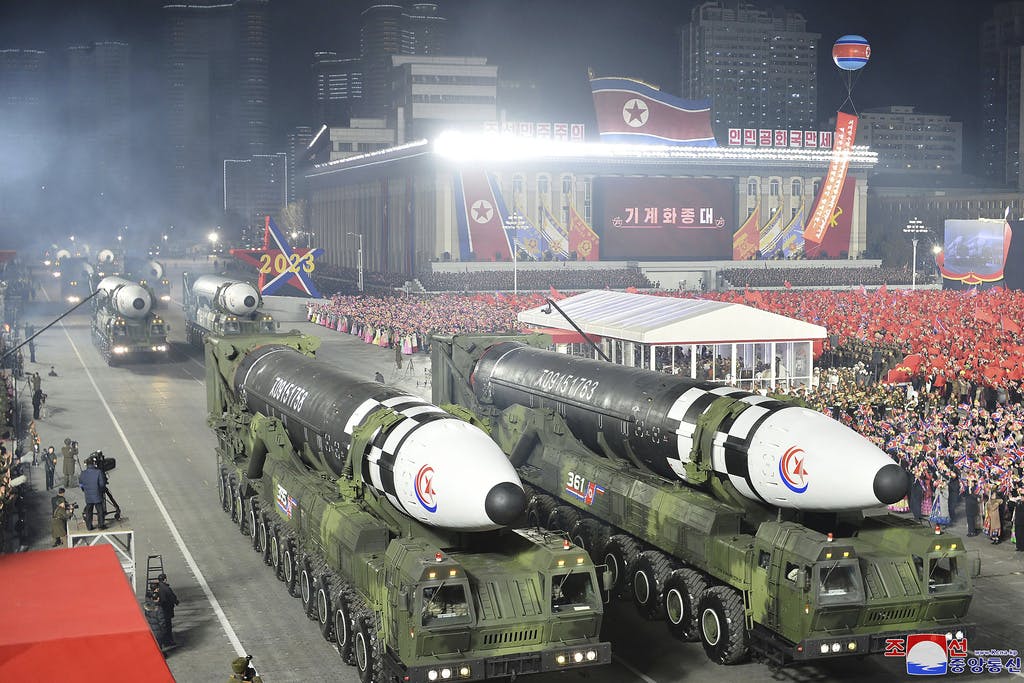On 70th Anniversary of Korean Truce, Congress Weighs Declaring the Conflict Over
On a day of memorials in the capitals of North and South Korea and the foreign countries that fought to guarantee their survival, debate rages over not just who won but whether the war has ended.

WASHINGTON — The 70th anniversary Thursday of the signing of the truce that ended the Korean War raises a puzzling question: is the war really over?
On a day of memorials in the capitals of North and South Korea and the foreign countries that fought to guarantee their survival, debate rages over not just who won but whether the war had ended.
At the crux of the debate is whether Congress should pass a bill providing for an end-of-war declaration leading to a formal peace treaty in place of the armistice signed at what’s now known as the “truce village” of Panmunjom astride the North-South line about 35 miles north of Seoul.
A one-time director of Asia policy for the National Security Council, Victor Cha, had a ready answer when asked what he thought a peace declaration or treaty would accomplish.
There was no reason, said Mr. Cha, on the NSC during the presidency of George W. Bush, to adopt a measure that would only “create a false peace for the peninsula” while opening “a pandora’s box of issues” about whether America should keep its bases and troops in South Korea.
Mr. Cha, now a professor at Georgetown and adviser with the Center for Strategic and International Studies in Washington, doubted if North Korea would enter into serious talks on giving up its nuclear and missile programs or reducing the size of its armed forces, including 1.2 million troops in all services. It would, he said, be “hard to contemplate any benefit” from declaring a formal end to the war.
At Pyongyang, North Korea’s leader, Kim Jong-un, left no doubt of the North Korean claim that its forces had won the war that began more than three years earlier with the invasion of South Korea on orders of his grandfather, regime founder Kim Il-sung, on June 25, 1950.
It was, Mr. Kim said on a visit to Fatherland Liberation War Martyrs’ Cemetery, “a great victory of human history which gave an indelible disgrace and defeat to the U.S. imperialists.”
On Thursday, when Mr. Kim is expected to review a parade of North Korean military might, he’ll be joined by top officials of the two countries that rose to North Korea’s defense after American and South Korean troops had turned back the invasion and driven to the Yalu River border with China.
The Russian defense minister, Sergei Shoigu, took time off from directing beleaguered Russian forces in Ukraine to go to Pyongyang and talk about Russian aid for North Korea.
A member of the politburo of the Chinese Communist Party, Li Hongzhong, led a Chinese delegation as a reminder that China’s “volunteers” had been largely responsible for rescuing North Korea from defeat and oblivion.
But the war is far from over, in the view of activists planning demonstrations, a rally, press conferences, and discussions Thursday and Friday.
The prime force behind demands for legislation proclaiming an end to the war is “Women Cross DMZ,” named for a group of 30 women that visited North Korea eight years ago, held talks with North Koreans and returned to South Korea across the North-South line.
On Thursday the women are meeting with members of congress, pressing for passage of a bill that would proclaim an end to the Korean War.
Recriminations over the bill have almost swept aside publicity over memorial services as reminders of the personal tragedy of the war.
The president of the Center for Security Policy in Washington, Frank Gaffney, denounced the bill as “inane.” The effect, he said, would be to undermine the role of American troops in Korea, leading to demands for their withdrawal while gaining nothing in return.
“The ‘Peace on the Korean Peninsula Act’ provides a strategic advantage for the North Korean dictatorship,” said a conservative grouping, the One Korea Network.
The aim, One Korea said, is “to dismantle the United Nations Command,” set up in the opening days of the Korean War as a bulwark against North Korean and Chinese forces. The treaty, added One Korea, would “serve China’s interests.”
The California congressman responsible for introducing the bill, Brad Sherman, will be talking about it in public events Thursday along with others who have joined in supporting it. The bill is not given much chance of passage by the present Congress but is sure to remain a topic of discussion.
South Korea’s president, Yoon Suk-yeol, leading memorial services at a cemetery in Busan, the southeastern Korean port city to which the government retreated after the North Korean invasion, opposes the bill as strenuously as its American critics.
Mr. Yoon blames “anti-state forces” for having “undermined South Korea’s security by begging for lifting U.N. sanctions on North Korea and pushing for an end-of-war declaration with Pyongyang.”

